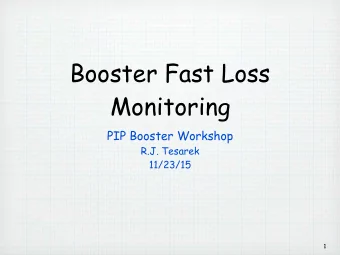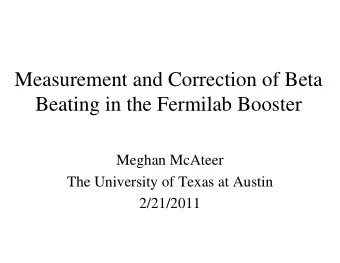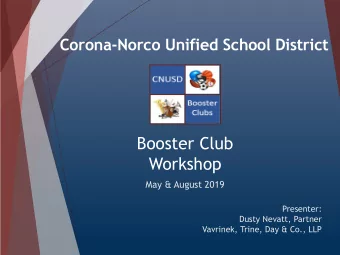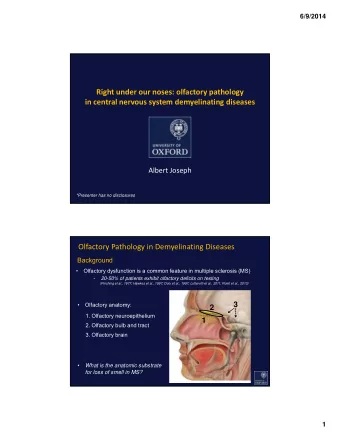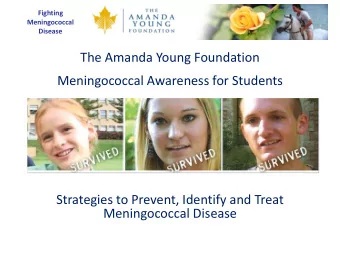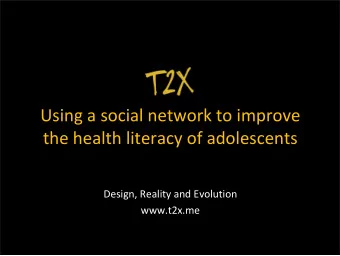
Booster And Meningitis C Booster What t is Di Diphtheria, - PowerPoint PPT Presentation
Diphtheria, Tetanus and Polio Booster And Meningitis C Booster What t is Di Diphtheria, theria, Tet etan anus an and Polio? These are 3 separate diseases:- Diph phther theria ia is a contagious bacterial infection which
Diphtheria, Tetanus and Polio Booster And Meningitis C Booster
What t is Di Diphtheria, theria, Tet etan anus an and Polio? These are 3 separate diseases:- • Diph phther theria ia – is a contagious bacterial infection which effects the upper respiratory tract (chest and throat) and occasionally the skin Tetan anus us – is a bacterial infection that can attack the muscles and • attack the nervous system Poli lio o (poliomyelitis) - is a contagious virus which first infects the • gut/stomach, but then travels to the nervous system and can cause a meningitis-like infection. It can sometimes cause paralysis of the arms or legs These are now rare in this country due to immunisations
Wh What t is is me meni ning ngoc ococcal occal group oup C bact acteri eria ? A bacteria that can cause two very serious illnesses, meningitis and septicaemia Meningi ningitis tis - is an infection of the protective membranes that surround the brain and spinal cord. This infection causes these membranes (the meninges) to become inflamed, which in some cases can damage the nerves and brain Septic icaemia aemia - (another name for blood poisoning) refers to invasion of bacteria into the bloodstream. If not treated quickly, sepsis can eventually lead to multiple organ failure and death
What is a Diphtheria, Tetanus and Polio booster and why is it needed? • An injection given by a small fine needle into the muscle in your upper arm by a nurse • 5 doses in total are needed to give you life long immunity and this is your 5 th and final dose • Antibodies produced after vaccination protect you from getting these diseases
What is a Meningitis C booster and why is it needed? • An injection given by a small fine needle into the muscle in your upper arm by a nurse • 3 doses are needed to give you immunity into early adulthood, and this is your 3 rd and final dose • Meningitis C is most common in early childhood • Between the ages of 15 and 19 is the next biggest age group at risk
Where will the injection take place? This injection will take place in school during lesson times. You will be given information by school staff about what room to attend and what time to attend
Does everyone need to have these injections? The majority will need two injections, one in each arm • One is for DIPTHERIA, TETANUS AND POLIO and one • is for MENINGITIS C It is important that everyone comes to the session
What happens now? You will be given two consent forms with a letter and • information leaflets to take home to give to your parent or guardian • Consent forms MUST be completed, signed and returned to school by the date stated on the letter • Please return your consent forms for both injections to school as soon as possible even if your parent or guardian has said no • If you have any concerns speak to your school nurse.
What do you need to do on the day? • Eat breakfast • Ensure medication in school • Wear a vest / T shirt under your shirt or blouse • Be calm • Do not believe scare tactics • Support your peers
After the injection • You will be given an ‘after care’ information sheets to take home for you and your parents to read • It is important you return to class when asked to do so • Occasional side effects include a sore arm and high temperature
Common questions • What if I loose my form? Obtain a replacement, school nurse or office • Will the injection hurt? You are likely to feel a small scratch on your arm • Can I do sport after the injection? Yes you can!
Further information • More information about everything covered in the presentation can be found at www.nhs.uk/vaccinations • Please read the leaflet we send home with your consent form • Please talk to your parent/guardian • If you have any questions, please speak to your school nurse Thank you for listening
Recommend
More recommend
Explore More Topics
Stay informed with curated content and fresh updates.






